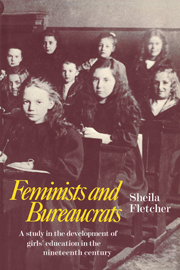Book contents
- Frontmatter
- Contents
- Preface
- Introduction: The Endowed Schools Act
- 1 The shaping of Section 12
- 2 The men who rejected the dead hand
- 3 The money problem
- 4 Opponents
- 5 Supporters
- 6 What was achieved
- 7 The changeover of 1874
- 8 The long haul
- 9 The Charity Commission spirit
- 10 The women's movement in the later years
- Appendices
- Notes
- Select Bibliography
- Index
7 - The changeover of 1874
Published online by Cambridge University Press: 07 October 2011
- Frontmatter
- Contents
- Preface
- Introduction: The Endowed Schools Act
- 1 The shaping of Section 12
- 2 The men who rejected the dead hand
- 3 The money problem
- 4 Opponents
- 5 Supporters
- 6 What was achieved
- 7 The changeover of 1874
- 8 The long haul
- 9 The Charity Commission spirit
- 10 The women's movement in the later years
- Appendices
- Notes
- Select Bibliography
- Index
Summary
We lent them a pruning-hook and they have turned it into a sword wherewith to sweep over the land.
William Torrens, 1874As Falstaff says, Rebellion lay in his way and he took it: so I suppose I must say, Confiscation lay in my way, and I took it – but not from any particular pleasure I have in it.
Lord Lyttelton, 1874When the Conservatives returned to office in February 1874 it was clearly only a matter of time before they despatched the Endowed Schools Commission. How this should be done they were not wholly agreed and in the end they did it so clumsily as to bring some discredit on themselves. But that it was bound to be done few doubted. The Commission's existence had now become ‘a rather burning political question’. Indeed the reform of endowments had been so almost from the start. For this very reason Maria Grey was careful in 1871 not to give it too much prominence when it came to drafting the aims of her Women's Education Union. However it might have seemed at the beginning – and the Endowed Schools Bill, as we saw, was presented as more than a party measure – it had become one with a vengeance as soon as attempts were made to apply it. Then the Tory press in Bristol exclaimed against despotic powers conferred by ‘an obsequious or sleepy Parliament’, and in Exeter opened fire on ‘Liberal apologists of confiscation’, while in London the Tory peers defended Emanuel Hospital so fiercely that the Government was forced to retreat. ‘It took all Gladstone's strength to maintain the law’, Hobhouse said later.
- Type
- Chapter
- Information
- Feminists and BureaucratsA Study in the Development of Girls' Education in the Nineteenth Century, pp. 119 - 132Publisher: Cambridge University PressPrint publication year: 1980



